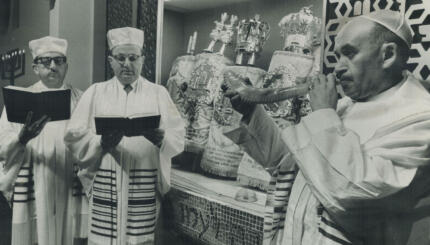Yom Kippur is a day set apart by the Torah for us to “practice self-denial” (Leviticus 23:27). The “self-denial” which seems to be most expressive of Yom Kippur is fasting, abstaining from food and drink for the entire day.
Fasting is an opportunity for each of us to observe Yom Kippur in a most personal way. It is a day of intense self-searching and earnest communication with the Almighty. This search requires an internal calm which derives from slowing down our biological rhythm. Fasting on Yom Kippur provides the key to our inner awakening.
On Yom Kippur we seek reconciliation with God and humanity. Repentance (Teshuvah) involves a critical self-assessment of the past year and the resolve to avoid lapses in sensitivity in the future. Teshuvah requires discipline. Our fasting on Yom Kippur demonstrates our willingness to submit to discipline. How can we atone for our excesses toward others unless we can curb appetites which depend on no one but ourselves? To set boundaries for our own conduct in this very private matter is to begin the path toward controlling our public behavior.
The fast of Yom Kippur reaches beyond our inner spiritual awakening and discipline into our ethical behavior. In the Haftarah [prophetic reading] we read on Yom Kippur morning of the prophet Isaiah providing us with the ultimate goal of our fast–to unlock the shackles of injustice, to undo the fetters of bondage, to let the oppressed go free, to share bread with the hungry (Isaiah 58:1-14).
With your help, My Jewish Learning can provide endless opportunities for learning, connection and discovery.
Finally, to fast on the Day of Atonement is an act of solidarity with the suffering of the Jewish people. Through fasting we are drawn closer to all who live lives of deprivation. Our faith demands more of us than 24 hours of abstinence from food. It demands that upon the completion of our fast we will turn back to the world prepared to act with love and compassion. In this way fasting touches the biological as well as the spiritual aspects of our being.
Reprinted with permission from Gates of the Season: A Guide to the Jewish Year (Central Conference of American Rabbis).
Torah
Pronunced: TORE-uh, Origin: Hebrew, the Five Books of Moses.
Yom Kippur
Pronounced: yohm KIPP-er, also yohm kee-PORE, Origin: Hebrew, The Day of Atonement, the holiest day on the Jewish calendar and, with Rosh Hashanah, one of the High Holidays.



